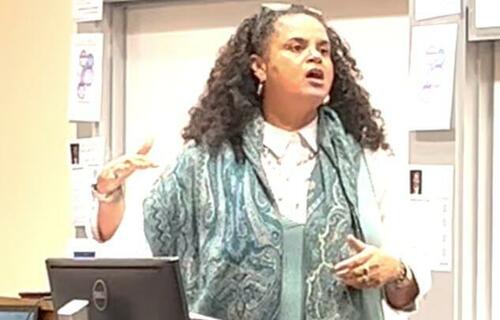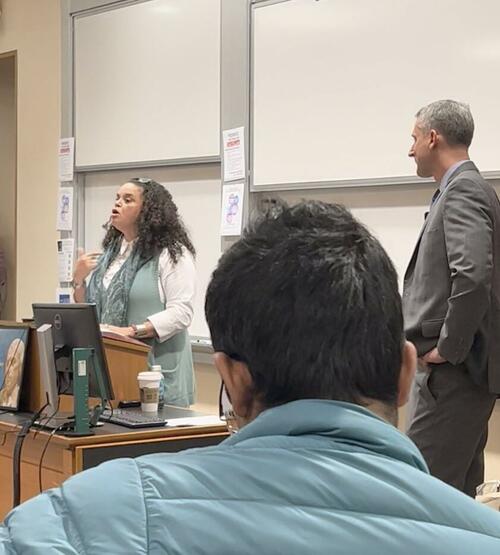
Tirien Steinbach, the diversity administrator at Stanford Law School who stoked a disruptive protest of Fifth Circuit appellate judge Kyle Duncan, is "currently on leave," according to a memo on the protest reviewed by the Washington Free Beacon.
Jenny Martinez, the law school's dean, said in a Wednesday morning memo to all law students that administrators "should not insert themselves into debate with their own criticism of the speaker's views." At future talks, the role of administrators will be to "ensure that university rules on disruption of events will be followed," Martinez said.
Martinez gave no additional details on the terms of Steinbach's leave, stating that the "university does not comment publicly on pending personnel matters." She also ruled out disciplining any of the students who shouted down Duncan - in part, she said, because administrators sent "conflicting signals about whether what was happening was acceptable or not."
Instead, the law school will require all students to attend a training on "freedom of speech and the norms of the legal profession," which will discuss, among other things, how "vulgar personal insults" can harm students' "professional reputations."
That warning appears to be in reference to protesters who hurled sexual invective at Duncan, with one allegedly telling him, "We hope your daughters get raped."
It comes amid calls from Sen. Ted Cruz (R., Texas) and others for state bar associations to investigate the hecklers, which could potentially hold up their legal licenses.
As Jonathan Turley details below, this "leave" comes after Steinbach publicly responded and appears to be doubling down on her actions in a Wall Street Journal opinion column.
First a short recap of how we got here.
The Stanford Federalist Society invited Judge Duncan of the United States Court of Appeals for the Fifth Circuit to speak on campus. However, liberal students, including members from the National Lawyer’s Guild, decided that allowing a conservative judge to speak on campus is intolerable and set about to “deplatform” him by shouting him down.
In this event, Duncan was planning to speak on the topic: “The Fifth Circuit in Conversation with the Supreme Court: Covid, Guns, and Twitter.” A video shows that the students prevented Duncan from speaking from the very beginning. Many called him a racist while others hurled insults like one yelling “We hope your daughters get raped.”
Duncan was unable to continue and asked for an administrator to assist him.
Dean Steinbach then took the stage and criticized the judge for seeking to be heard despite such objections.
Steinbach explained “I had to write something down because I am so uncomfortable up here. And I don’t say that for sympathy, I just say that I am deeply, deeply uncomfortable.” While reaffirming her belief in free speech and insisting that the judge should not be cancelled, she proceeded to attack the judge for the content of his views.
Steinbach declared “It’s uncomfortable to say that for many people here, you’re work has caused harm.” After a perfunctory nod to free speech, Steinbach proceeded to eviscerate it. She continued “again I still ask, is the juice worth the squeeze?” Is it worth the pain that this causes, the division that this causes? Do you have something so incredibly important to say about Twitter and guns and Covid that that is worth this impact on the division of these people.”
Dean Martinez later apologized and then released a letter with Stanford President Marc Tessier-Lavigne that reaffirmed the commitment to free speech, but did not commit to holding the students accountable for their disruption. (The students with the National Lawyer’s Guild later complained about their names being mentioned in an article despite a campaign to name and shame conservative students).
Dean Martinez then issued another letter with a strong defense of free speech and declared that all students (including the victims of the disruption) would be required to attend a free speech appreciation session. However, she declined any action against the students responsible for the disruption. That is a familiar pattern at universities.
That brings us to Steinbach’s column.
The Wall Street Journal was correct in running her account and it contains an important perspective to consider, even for some of us who were highly critical of Steinbach’s remarks.
First, Dean Steinbach rightfully points out that she tried to get the students to allow the event to proceed. At one point, she suggested that students walk out in protest over Judge Duncan’s views. She also insists that she opposed efforts to cancel the event before it was held and continues to oppose such attempts to limit speech. She reaffirms the classical liberal view that the solution to bad speech is good speech, not less speech. That is all to her credit.
However, the column has elements that are, frankly, less compelling or commendable.
Steinbach appears to be responding to this admonishment by Martinez:
In this instance, however, the failure by administrators in the room to timely administer clear and specific warnings and instead to send conflicting signals about whether what was happening was acceptable or not (and indeed at one point to seemingly endorse the disruptions that had occurred up to that point by saying “I look out and say I’m glad this is going on here”) is part of what created the problem in the room and renders disciplinary sanction in these particular circumstances problematic.
Steinbach insists that she was simply using her training at “deescalation” and that she was asked to attend the event by the Federalist Society for that reason:
I stepped up to the podium to deploy the de-escalation techniques in which I have been trained, which include getting the parties to look past conflict and see each other as people. My intention wasn’t to confront Judge Duncan or the protesters but to give voice to the students so that they could stop shouting and engage in respectful dialogue. I wanted Judge Duncan to understand why some students were protesting his presence on campus and for the students to understand why it was important that the judge be not only allowed but welcomed to speak.
The problem with the column, in my view, is two-fold.
First, in her remarks, Steinbach goes out of the way to show her agreement with the mob and indicates that she knew that they were going to stop the event. She soft pedals the attacks on Duncan and seems to blame both sides. She does not mention how the students prevented him from speaking, yelled about his being a racist, or called for the rape of his daughters. Instead, she describes how “a verbal sparring match began to take place between the judge and the protesters. By the time Judge Duncan asked for an administrator to intervene, tempers in the room were heated on both sides.” That sounds a lot like blaming the victim. If the mob had not prevented the judge from speaking, there would have been “sparring” before the event was opened up for questions.
She is not alone in such spins. Some like Slate’s Mark Stern suggested that Judge Duncan manufactured the controversy. Democratic members like Rep. Elissa Slotkin (D-MI) mocked Duncan as a “fragile flower.” Others at sites like Above the Law insisted, again, that silencing people like Judge Duncan is free speech. Senior Editor Joe Patrice rejected the effort to “recast ‘free speech’ as the right of a powerful person to speak at the silent and unprivileged.” (In this case, “the silent and unprivileged” are Stanford students at an elite law school, who were invited to ask questions but asked not to prevent others from hearing from Judge Duncan).
Second, Steinbach still chastises Duncan for his divisive viewpoints and clearly blames him in part for the controversy by refusing to yield to the sensibilities of the students — presumably by remaining silent.
At one point during the event, I asked Judge Duncan, “Is the juice worth the squeeze?” I was referring to the responsibility that comes with freedom of speech: to consider not only the benefit of our words but also the consequences. It isn’t a rhetorical question. I believe that we would be better served by leaders who ask themselves, “Is the juice (what we are doing) worth the squeeze (the intended and unintended consequences and costs)?”
Steinbach appears utterly clueless about why this question is so offensive to free speech values. She continues to intentionally obscure her obvious desire for speakers like Duncan to curtail their speech by stating that we would “be better served” by speakers asking if their speech is worth “the intended and unintended consequences and costs.”
Avoiding “the squeeze” means being silent on points that have such consequences. Thus, to avoid angering these radical students, Duncan is expected to be silent on certain points or, in this case, any points that he might want to share. It is an invitation for self-censorship that would apply to any conservative jurist or speaker. While supporting free speech, Steinbach is condemning the exercise of speech when it could cause “pain” and “division.” Of course, such pain and division would not arise with a liberal jurist espousing the opposite viewpoints. Accordingly, liberal jurists would be free to speak without the sense of culpability while conservatives are expected to remain silent.
In the end, Steinbach did not “defuse” the situation but fueled the rage with her comments. To this day, she cannot understand why Duncan would persist in speaking when some take such great offense at his views. She asks “Is there a way that we can stop blaming and start to talk and listen to each other?” Yet, her answer appears to be for speakers like Duncan to recognize that their views are simply too hurtful for some and should not be voiced to avoid “the squeeze” of free speech.
The result is the type of doublespeak that is common on our campuses. Steinbach claims fealty to free speech while denouncing its exercise. She laments “how polarized our society has become,” but added to that polarization by expressing her own concerns over the “harm” that Duncan’s speech has brought for many at the school. She asked “how do we listen and talk to each other as people” while maintaining that, by stating his jurisprudential views, Duncan might not be worth the harm (or “squeeze”) to others.
Anti-free speech advocates often try to portray the exercise of free speech as a complex challenge. It is not. The Duncan controversy shows how the issue is stark and simple. Judge Duncan had a right to speak and others had a right to hear him. Those who disagree with him had a right to protest outside of the event and to ask tough questions inside the event. The only thing that they could not do is disrupt the event itself; to prevent others from hearing from Judge Duncan.
[ZH: We note that Judge Duncan, a Trump appointee, delivered a speech at the University of Notre Dame last night (March 24), telling listeners that there’s a “vital tradition of free speech in this country” and that students have the right to protest him.
“It’s a great country, where you can harshly criticize federal judges and nothing bad will happen to you. You might even get praised or promoted,” he said.
“But make no mistake. What went on in that classroom on March the ninth had nothing to do with our proud American tradition of free speech. It was rather a parody of it.”]
The solution is also stark and simple, though it has, once again, been ignored by an administration.
Students who cancel events or classes on campus are taking a position that is not just antithetical to principles of free speech but of higher education. They should be suspended or, in extreme or repeated cases, expelled.
Otherwise, the law school is not achieving any greater clarity than this column. It is professing an absolute commitment to free speech while declining to enforce that commitment.
Tirien Steinbach, the diversity administrator at Stanford Law School who stoked a disruptive protest of Fifth Circuit appellate judge Kyle Duncan, is “currently on leave,” according to a memo on the protest reviewed by the Washington Free Beacon.
Jenny Martinez, the law school’s dean, said in a Wednesday morning memo to all law students that administrators “should not insert themselves into debate with their own criticism of the speaker’s views.” At future talks, the role of administrators will be to “ensure that university rules on disruption of events will be followed,” Martinez said.
Martinez gave no additional details on the terms of Steinbach’s leave, stating that the “university does not comment publicly on pending personnel matters.” She also ruled out disciplining any of the students who shouted down Duncan – in part, she said, because administrators sent “conflicting signals about whether what was happening was acceptable or not.”
Instead, the law school will require all students to attend a training on “freedom of speech and the norms of the legal profession,” which will discuss, among other things, how “vulgar personal insults” can harm students’ “professional reputations.”
That warning appears to be in reference to protesters who hurled sexual invective at Duncan, with one allegedly telling him, “We hope your daughters get raped.”
It comes amid calls from Sen. Ted Cruz (R., Texas) and others for state bar associations to investigate the hecklers, which could potentially hold up their legal licenses.
As Jonathan Turley details below, this “leave” comes after Steinbach publicly responded and appears to be doubling down on her actions in a Wall Street Journal opinion column.
First a short recap of how we got here.
The Stanford Federalist Society invited Judge Duncan of the United States Court of Appeals for the Fifth Circuit to speak on campus. However, liberal students, including members from the National Lawyer’s Guild, decided that allowing a conservative judge to speak on campus is intolerable and set about to “deplatform” him by shouting him down.
In this event, Duncan was planning to speak on the topic: “The Fifth Circuit in Conversation with the Supreme Court: Covid, Guns, and Twitter.” A video shows that the students prevented Duncan from speaking from the very beginning. Many called him a racist while others hurled insults like one yelling “We hope your daughters get raped.”
Duncan was unable to continue and asked for an administrator to assist him.
Dean Steinbach then took the stage and criticized the judge for seeking to be heard despite such objections.
Steinbach explained “I had to write something down because I am so uncomfortable up here. And I don’t say that for sympathy, I just say that I am deeply, deeply uncomfortable.” While reaffirming her belief in free speech and insisting that the judge should not be cancelled, she proceeded to attack the judge for the content of his views.
Steinbach declared “It’s uncomfortable to say that for many people here, you’re work has caused harm.” After a perfunctory nod to free speech, Steinbach proceeded to eviscerate it. She continued “again I still ask, is the juice worth the squeeze?” Is it worth the pain that this causes, the division that this causes? Do you have something so incredibly important to say about Twitter and guns and Covid that that is worth this impact on the division of these people.”
Dean Martinez later apologized and then released a letter with Stanford President Marc Tessier-Lavigne that reaffirmed the commitment to free speech, but did not commit to holding the students accountable for their disruption. (The students with the National Lawyer’s Guild later complained about their names being mentioned in an article despite a campaign to name and shame conservative students).
Dean Martinez then issued another letter with a strong defense of free speech and declared that all students (including the victims of the disruption) would be required to attend a free speech appreciation session. However, she declined any action against the students responsible for the disruption. That is a familiar pattern at universities.
That brings us to Steinbach’s column.
The Wall Street Journal was correct in running her account and it contains an important perspective to consider, even for some of us who were highly critical of Steinbach’s remarks.
First, Dean Steinbach rightfully points out that she tried to get the students to allow the event to proceed. At one point, she suggested that students walk out in protest over Judge Duncan’s views. She also insists that she opposed efforts to cancel the event before it was held and continues to oppose such attempts to limit speech. She reaffirms the classical liberal view that the solution to bad speech is good speech, not less speech. That is all to her credit.
However, the column has elements that are, frankly, less compelling or commendable.
Steinbach appears to be responding to this admonishment by Martinez:
In this instance, however, the failure by administrators in the room to timely administer clear and specific warnings and instead to send conflicting signals about whether what was happening was acceptable or not (and indeed at one point to seemingly endorse the disruptions that had occurred up to that point by saying “I look out and say I’m glad this is going on here”) is part of what created the problem in the room and renders disciplinary sanction in these particular circumstances problematic.
Steinbach insists that she was simply using her training at “deescalation” and that she was asked to attend the event by the Federalist Society for that reason:
I stepped up to the podium to deploy the de-escalation techniques in which I have been trained, which include getting the parties to look past conflict and see each other as people. My intention wasn’t to confront Judge Duncan or the protesters but to give voice to the students so that they could stop shouting and engage in respectful dialogue. I wanted Judge Duncan to understand why some students were protesting his presence on campus and for the students to understand why it was important that the judge be not only allowed but welcomed to speak.
The problem with the column, in my view, is two-fold.
First, in her remarks, Steinbach goes out of the way to show her agreement with the mob and indicates that she knew that they were going to stop the event. She soft pedals the attacks on Duncan and seems to blame both sides. She does not mention how the students prevented him from speaking, yelled about his being a racist, or called for the rape of his daughters. Instead, she describes how “a verbal sparring match began to take place between the judge and the protesters. By the time Judge Duncan asked for an administrator to intervene, tempers in the room were heated on both sides.” That sounds a lot like blaming the victim. If the mob had not prevented the judge from speaking, there would have been “sparring” before the event was opened up for questions.
She is not alone in such spins. Some like Slate’s Mark Stern suggested that Judge Duncan manufactured the controversy. Democratic members like Rep. Elissa Slotkin (D-MI) mocked Duncan as a “fragile flower.” Others at sites like Above the Law insisted, again, that silencing people like Judge Duncan is free speech. Senior Editor Joe Patrice rejected the effort to “recast ‘free speech’ as the right of a powerful person to speak at the silent and unprivileged.” (In this case, “the silent and unprivileged” are Stanford students at an elite law school, who were invited to ask questions but asked not to prevent others from hearing from Judge Duncan).
Second, Steinbach still chastises Duncan for his divisive viewpoints and clearly blames him in part for the controversy by refusing to yield to the sensibilities of the students — presumably by remaining silent.
At one point during the event, I asked Judge Duncan, “Is the juice worth the squeeze?” I was referring to the responsibility that comes with freedom of speech: to consider not only the benefit of our words but also the consequences. It isn’t a rhetorical question. I believe that we would be better served by leaders who ask themselves, “Is the juice (what we are doing) worth the squeeze (the intended and unintended consequences and costs)?”
Steinbach appears utterly clueless about why this question is so offensive to free speech values. She continues to intentionally obscure her obvious desire for speakers like Duncan to curtail their speech by stating that we would “be better served” by speakers asking if their speech is worth “the intended and unintended consequences and costs.”
Avoiding “the squeeze” means being silent on points that have such consequences. Thus, to avoid angering these radical students, Duncan is expected to be silent on certain points or, in this case, any points that he might want to share. It is an invitation for self-censorship that would apply to any conservative jurist or speaker. While supporting free speech, Steinbach is condemning the exercise of speech when it could cause “pain” and “division.” Of course, such pain and division would not arise with a liberal jurist espousing the opposite viewpoints. Accordingly, liberal jurists would be free to speak without the sense of culpability while conservatives are expected to remain silent.
In the end, Steinbach did not “defuse” the situation but fueled the rage with her comments. To this day, she cannot understand why Duncan would persist in speaking when some take such great offense at his views. She asks “Is there a way that we can stop blaming and start to talk and listen to each other?” Yet, her answer appears to be for speakers like Duncan to recognize that their views are simply too hurtful for some and should not be voiced to avoid “the squeeze” of free speech.
The result is the type of doublespeak that is common on our campuses. Steinbach claims fealty to free speech while denouncing its exercise. She laments “how polarized our society has become,” but added to that polarization by expressing her own concerns over the “harm” that Duncan’s speech has brought for many at the school. She asked “how do we listen and talk to each other as people” while maintaining that, by stating his jurisprudential views, Duncan might not be worth the harm (or “squeeze”) to others.
Anti-free speech advocates often try to portray the exercise of free speech as a complex challenge. It is not. The Duncan controversy shows how the issue is stark and simple. Judge Duncan had a right to speak and others had a right to hear him. Those who disagree with him had a right to protest outside of the event and to ask tough questions inside the event. The only thing that they could not do is disrupt the event itself; to prevent others from hearing from Judge Duncan.
[ZH: We note that Judge Duncan, a Trump appointee, delivered a speech at the University of Notre Dame last night (March 24), telling listeners that there’s a “vital tradition of free speech in this country” and that students have the right to protest him.
“It’s a great country, where you can harshly criticize federal judges and nothing bad will happen to you. You might even get praised or promoted,” he said.
“But make no mistake. What went on in that classroom on March the ninth had nothing to do with our proud American tradition of free speech. It was rather a parody of it.”]
The solution is also stark and simple, though it has, once again, been ignored by an administration.
Students who cancel events or classes on campus are taking a position that is not just antithetical to principles of free speech but of higher education. They should be suspended or, in extreme or repeated cases, expelled.
Otherwise, the law school is not achieving any greater clarity than this column. It is professing an absolute commitment to free speech while declining to enforce that commitment.
Loading…






